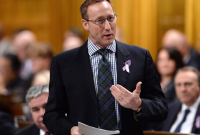Support strong Canadian climate journalism for 2025
Pity party
It was a depressingly small performance, even for a Twitter thumbnail.
Last weekend, social media exhumed clips from a 2018 Stephen Harper interview with Dennis Prager, in which he bemoaned the absence of a Fox News network in Canada and blamed his 2015 defeat on leftist media outlets that coordinated their election coverage to censor his party’s message.
Ever since Canada’s Sun News Network went belly up, he said, all our remaining news networks are the equivalent of MSNBC.
Behold Stephen Harper, the powerhouse victor of three back-to-back elections, all won with the self-same news outlets and journalists. Here’s a man who dominated this country for almost a decade, strode the world stage with Barack Obama, Angela Merkel and other historic figures, now reduced to fabricating bitter recriminations against the media on a second-rate YouTube channel.
Who knew Stephen Harper’s shadow across Canadian history would be so short?

And quite a way to reward his endorsement by almost every print newspaper in the country.
The whole video is worth a watch, especially from the vantage point of 2020. While mercifully eschewing America’s extreme right wing, Harper misread almost every world leader, and ultimately his own country.
Merkel, he said, would never recover public confidence after opening Germany’s borders during the refugee crisis. Today she sits at almost 80 per cent support, having successfully led Germany and Europe through Brexit and the coronavirus pandemic.
Harper expressed luke-warm support for Vladimir Putin’s closest ally in Europe, Viktor Orban, who last month granted himself indefinite authoritarian rule over Hungary.
He praised Benjamin Netanyahu, who advised him that censorship is “the only way the left can win (is to) shout you down, drown you out… You lose when they edit you entirely out. When they make sure you don’t get a share of voice at all.”
Today, Netanyahu is on trial for bribery and corruption, stemming in part from his alleged attempts to manipulate media coverage.
And incredibly about Donald Trump, Harper said: “You can’t find an anti-black or anti-Jewish statement Donald Trump has ever made in his life.” This, after Charlottesville, birtherism, the Central Park Five, Elijah Cummings, Colin Kaepernick, “s**thole countries” and countless other examples.
The strongman theme is impossible to ignore.
The question of legacy
What comes into sharper relief, after the passage of time, is the question of legacy.
Did Harper really carve out an inspiring new vision for 21st century Canadian Conservatism, or did he simply dominate through fear?
Did he just enforce enough party unity to score an electoral fluke during a period of national political flux?
A generation of former cabinet ministers has come and gone since Harper governed. In that time, the right’s energy and narrative has been seized by Trumpian ideologues schooled by Roger Stone and Breitbart.
Harper is wise enough to understand that brand doesn’t translate in Canada, but now that the fear is gone, what remains of his own? The CPC, virtually shut out of Quebec and the 905, is largely reduced to a regional Prairie party.
From the wings, Stephen Harper may still control his chastened party, but Canadians have moved on.
Power may be enigmatic and mercurial, but you know it's finally over when the laughter is following you out the door.







Comments
Couldn't agree more. Thanks Sandy.
Absolutely accurate on all counts. Although one might say that while it's been reduced to a regional Prairie party, that party is still largely controlled and managed by individuals from and/or based in central Canada. Thanks, Sandy.
Throughout his too long tenure, Harper and his locked-down party marched along like robots with very limited speech algorithms and even fewer original or effective ideas for directing Canada into a resilient nation, capable of weathering the obviously gathering storms.
Whatever "power" he and the CPC thought they had accrued, evidently withered in the face of actual reality as opposed to the media manufactured "conservative" reality. If his faithful conservative media flunkies failed the test of business reality, perhaps we can hope that our neighbors to the south will also be relieved of the oppressive burden of their own wing-nut media malefactors?
May it me so! Comparing Canada now, working on all levels to bring us through the pandemic, we are vastly better off than if Harper had been at the helm. He destroyed our scientific research and responsiveness. He ruled his bench as a dictator. I am glad his support has been negated. He has nothing of use to offer us.
Harper had 10 years to get it right with the people. Instead, we had a Dark Decade with the federal government of Alberta, essentially a petro-state that turned into an anti-science and immigrant-baiting mess.
In 2019 68% of the people voted centrist or progressive. Canada is not a conservative country because most elections over the last half century had similar results, even in 2011 which gave Harper a majority, the centre-progressive vote was 60%.
Harper's poor legacy and losses are not laughably attributable to a "lack" of media co-operation or coverage. That is simply childish blaming of the messenger for the fact the emperor's clothes are either outrageously distasteful or invisible, thus exposing the unsightly jiggly bits for all to see.
It would be shocking to hear someone seriously propose erecting a bronze statue of Stephen Harper someday. The majority of people simply won't have it because there is not a shred of a nation-building legacy in his character to honour. On the other hand, abstract artists could have field day with his well-known simmering anger.
Extolling the virtues of Ezra Levant's thankfully defunct Sun Media, now morphed into far right Rebel Media with its ties to white supremacy...egads! We can only hope Canada has moved on. See Michael Harris's latest article in The Tyee.
Can't wait to see all the abstract artists having a field day with his well-known simmering anger — should be great fun!
CPC theology anointed Harper as the shrewd fiscal conservative and sainted political warrior. Future historians will footnote that his regime coincided with a period some called “The End of History” when the battlefront between left and right had supposedly been strategically shortened by the proclaimed elimination of the Liberal centre, presumably the moribund left being left doomed in the crosshairs of the right’s holy long-gun. Harper bragged that when he was finished, Canada wouldn’t be recognizable.
As an agent of “Change”—or at least subject of that perennial slogan—Harper did do something no Canadian Prime Minister before or since ever did: undermine the sovereignty of his own country in the interests of stateless corporatism. Nevertheless, he wrapped himself in patriotic fantasies like Canada as an “oil-producing superpower” when all his home province of Albetar had was bitumen (granted, lots and lots of it), and master of ceremony in celebrating a Canadian victory over the Americans in the War of 1812 when Canada didn’t even exist as a nation until two generations later (the War was fought largely by regulars of the British Army and Navy). These will be interpreted as distractions from his government’s methodical sabotage of Canada’s sovereign capacity to forecast social needs, regulate foreign investments and activities in Canada, and uphold its Constitution. He succeeded in signing trade and Temporary Foreign Worker agreements that threatened to offend Canadian sovereignty an its Constitution. It was indeed a change, but one which largely failed and ultimately earned electoral disapproval.
His pious demeanour and knee-to-groin, hyper-partisan style, though diminishing parliamentary and political decorum and souring public attitudes toward governments, were actually distractions from his ulterior agenda of making Canada a super-polluter and handmaiden to greedy foreign investors. The administrative attack on Attawapiskat, one of hundreds of impoverished Aboriginal nations’ communities dependant largely upon official but unjustifiable parsimony, was intended to distract from Harper’s planned assault on Aboriginal Rights he needed To do in order to push the Northern Gateway pipeline through indigenous territories in BC which have no treaties, a considerable but popularly-misunderstood obstacle to his centrepiece project to export diluted bitumen to reputed “Asian buyers”—a disingenuous gambit that required disseminating a bogus American conspiracy to depress the price of the lowest-grade of petroleum of which Albetar is as well endowed as it is of orphaned conventional oil and gas wells. Attawapiskat instead fomented the Idle-No-More movement, an Aboriginal protest joined by a broad slice of non-Aboriginal citizens, which effectively gave the HarperCons a flat tire just as they rounded into the backstretch of their one and only majority.
At that point a series of indictments and court cases began to distract from the carefully crafted Harper theology; anti-abortionists whom Harper relegated to the backbench to fester in frustration until he won a majority became outspoken when the promised day came but Harper announced his disinclination to open the controversial issue (one such crusading CPC MP walked away to sit as an Independent as a result). The party was convicted and fined for illegal election campaign funding and investigated for trying to mislead voters with robocalls—its legislation to meddle with election rules looking all the more suspicious. Many pieces of CPC legislation were by this time getting stuck down by the SCoC. Fighting rearguard at last, Harper called the longest writ period in modern history and forbade open CPC rallies in order to massage potentially bad news from the concurrent trial of accused Conservative Senator Mike Duffy to a captured CPC audience. His desperate niqab ploy aimed at shoring up CPC support among an increasing proportion of bigots in the party’s electoral base was the fatal turning point of the campaign in which the initially third-place, rookie Liberal leader blew past Harper to win and end a government that had ascended by Only by default, treachery and cheating: it was never loved, eventually disaffected voters and fell far short of its own agenda by degrees— to the point of bigotry —and was defeated when the Liberals once again assumed the mantle.
As if he couldn’t believe he’d lost—or perhaps to forestall a fractious leadership race to replace him—Harper jumped the shark one more time by staying on as a Calgary MP after the CPC defeat. One wonders what internal party pressure convinced him to relent and resign. If that pressure came from the increasingly smaller moderate faction whose two leadership contenders were summarily swept aside in early balloting by the slate of extremists and bigots, it might explain why Harper, after all that’s happened, seems now to be floating a trial balloon for some kind of return, to interim leadership perhaps: perhaps there are no more moderate voices that can be heard above the surly snarling slogans of the far-right the party has adopted wholeheartedly.
Harper’s replacement, Andrew Scheer, was unable to regain power in the last election, the party’s seats are now split evenly between Western Reformers and Eastern Tories, extremists now Dominate support, and the CPC’s powerful personalities ape a presidunce who is ensuring America will suffer needlessly because of COVID19. Such poor fortune could only condone a Harper return by way of conceit.
The people have spoken twice: they don’t want Harper and they don’t want the thing he made and imposed on Canada. At some point—perhaps in history books—it will be conceded that Harper’s was the worst governing party Canada ever had, one that also failed to do what most Canadians never wanted it to do in the first place.
I think the headline should rather be in the past tense: not only has Harper’s power dissolved, so have the prospects for his party.
"... not only has Harper’s power dissolved, so have the prospects for his party."
Oh, let's hope so! But we mustn't forget that somewhere between 500,000 and a million voters marked their ballots with the strategy of defeating Harper and the CPC. It worked marvellously. And it will work again if necessary.
You ask “ Who knew Stephen Harper’s shadow across Canadian history would be so short?”
I respectfully disagree - we are still living in the shadow of all the funding cuts to invaluable non-governmental organizations ranging from child care and health to the environment, cuts to research programs that ended up closing or reducing their operations, loss of knowledge and skill of researchers laid off, reduced or eliminated environmental regulations (e.g. protection of waterways), disappeared climate change and children’s environmental health platforms, etc. We are paying the price by poorer public health outcomes, sinking educational quality, increased inequality, destroyed natural resources - the list is long. He managed to put Canada back in innovation and sustainable development for decades. He made an internationally respected country on the leading edge to one that is struggling to hang on in the speed of the rest of the world and that no one pays attention to Outside of Canada. It is very sad. But saddest of it all is the destruction of our collective resilience in the face of climate change, pollution, and biodiversity loss. We have the highest carbon footprint per capita in the world and together with the United States also produce most waste per person. That is a questionable honour to be proud of. That is Harper’s legacy and the price that we are still paying for generations to come. Before he was elected, Canada was one of the leading countries in public health, health promotion, health and environmental impact assessment development, children’s environmental health, etc.
Good points. And don't forget the per-vote subsidy!
And good riddance. What we do need in Canada is a reasonable (ie: not extremist) Conservative alternative that is based on a positive message, rather than a consistently out of step with reality, negative message, that is clearly owned by big corporations, interested in furthering the status quo. I want an alternative.
The only way that there will be an conservative alternate to the CPC, is if Peter "Judas" Mackay, takes the Progressive Conservatives out of the unholy alliance he sold them out to. It would make things a lot easier if the CPC just changed it's name back to the Reform Party, which is what they are.
That's not the only way. Other conservatives can break away and form their own parties. It's already happening. The People's Party didn't do too well, but now there's also the Wexit Party. I hope it keeps happening and that some of those parties are successful. I feel for conservatives. They are essentially party-less--all of them. It's better for conservatives and our democracy as a whole to have more parties. And yes, that leads to vote-splitting, but that's why we need Proportional Representation. Harper once supported it. I look forward to the day that more conservatives wise up and begin to do so as well.
Interesting that the video is now private, thanks for the article. Lest we forget....
Worst? Brian Mulroney made possible everything Harper did.
CUFTA, NAFTA ... they're not irrelevant at all to anything we're experiencing in terms of politics, climate and even COVID, which was carried on airplanes and on tourist ships, without having to bear any responsibility or liability.
But he's got the best environmental record of any PM--a strong statement about the corrupt and virtually useless nature of the Liberal Party.
Stephen Harper? Never, ever again. These rightists must all go the same training school because they sound lamentable similar.
Nice piece of Liberal propaganda.
Can anyone truly believe the CBC provides equal coverage and does not favour the Liberal party? Sickening how the lame reporters ask the same question over and over and get the same long winded double talk drama infused answer.
There has not been a single governing party that has not had a scandal or "properly" handled all policies. To say it is not currently happening now would be a lie.
We will see what hindsight says in a few years.
If the CPC is reduced to a rump as you say (and I'm not quite so ready to count it out) it's largely because the Trudeau Liberals have occupied the CPC's actual policy ground. Covid-19 emergency measures aside, what's really changed since 2015, other than the rhetoric, the hairstyle, the cut of the suit? Not much, from this "essentially" if precariously employed low-wage-slave's perspective. Your "analysis" is all about style, not substance, Ms. Garossino.
She didn't say it will be reduced to a rump. She said they're not going to win any elections, because the base is about 30% and that's not enough for a win.
The sad reality is that even if the CPC won more seats than the Liberals, Trudeau would have a good chance of holding onto his position as PM. He would test the confidence of the House and, as long as the other left-wing parties felt they'd have a better change getting the legislation they want with the Liberals, they'd vote for him. There's a possibility they'd back a Red Tory leader over the hopelessly corrupt Trudeau, but such a leader is never going to exist in the CPC because the base won't vote for someone like that.
Any potential leader who is electable by the CPC base is unelectable in the country as a whole. This is the bind that today's conservatives find themselves in.
It's so ironic that with the fall of the The Star, there is no mainstream daily news coverage that isn't conservative. Also ironic is the fact that the CBC, which one would presume to be liberal-leaning if not outright liberal-friendly, is fixated on anti-Trudea news coverage as much as Post Media outlets.
It's great you included a picture of the yellow sheet of shame, where every Post Media outlet endorsed Harper on the exact same weekend. I sure hope Journalism profs talk about how this was the beginning of the end for Canadian newspapers.
To add: An anecdote from Harper's reign: A friend of mine is fairly high up in Global Affairs (as it was called at time) and a colleague wrote an in-depth report on the state of a East European nation in a state of turmoil at the time (I'm leaving the details vague.) This person was a lifelong expert on this region and submitted the report with analysis and diplomatic recommendations to the PMO. Apparently King Harper read it himself and readily dismissed the analysis. Needless to say, as he was wrong on so many other World leaders, he was completely wrong here as well.